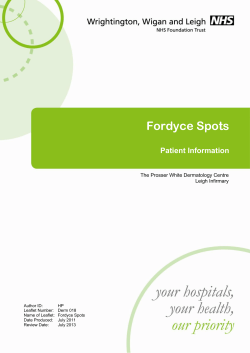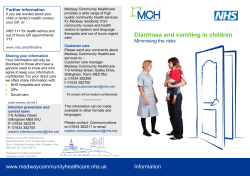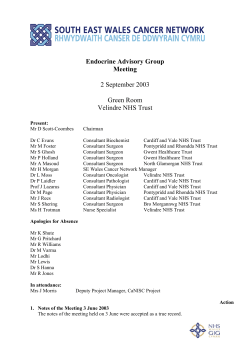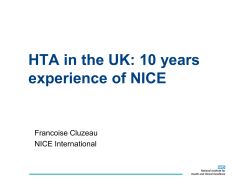
Proposed changes to NHS availability of erectile – dysfunction treatments
Proposed changes to NHS availability of erectile dysfunction treatments – changing prescribing restrictions for generic sildenafil Government response to consultation June 2014 Title: DH consultation response: Proposed changes to NHS availability of erectile dysfunction treatments – changing prescribing restrictions for generic sildenafil Author: Innovation, Growth & Technology/ Medicines, Pharmacy & Industry/ CCE /17090 Document Purpose: Policy Publication date: June 2014 Target audience: GPs and other appropriate prescribers Pharmacists Clinical Commissioning Groups NHS Sexual Health Teams & Specialist Clinics Doctors Group Drugs Manufacturers Pharmaceutical Trade Associations Contact details: edconsultation@dh.gsi.gov.uk You may re-use the text of this document (not including logos) free of charge in any format or medium, under the terms of the Open Government Licence. To view this licence, visit www.nationalarchives.gov.uk/doc/open-government-licence/ © Crown copyright Published to gov.uk, in PDF format only. www.gov.uk/dh 2 Proposed changes to NHS availability of erectile dysfunction treatments – changing prescribing restrictions for generic sildenafil Prepared by Clinical & Cost Effectiveness Team, Department of Health 3 Contents Background ................................................................................................................................ 5 Consultation process ................................................................................................................. 6 Response rates .......................................................................................................................... 7 Main themes .............................................................................................................................. 8 4 Background Legislative and Policy 1. Erectile dysfunction (ED) treatments are currently restricted on NHS prescription. The restrictions are set out in legislation and the treatments can only be prescribed by the NHS for ED in certain circumstances on the NHS. Originally the main reason for the restrictions was to keep the cost of treating men with impotence to between £10 and £12 million a year. Even with these restrictions in place, NHS spend on all erectile dysfunction treatments in 2012 was over £80million, of which around £40 million was for Viagra. 2. In 1999, the Department of Health undertook formal measures to restrict NHS prescription of erectile dysfunction treatments in NHS primary care. In England, the restrictions are through national prescribing legislation, with the European Commission’s Transparency Directive providing the basis of these restrictions. Article 7 of the Transparency Directive allows Member States to notify the Commission of measures regulating the pricing of medicinal products. One of the UK’s notified criteria, criterion 5 sets out that certain medicinal products may be excluded from NHS prescription (except in specified circumstances, or except in relation to specified conditions or categories of condition, or specified categories of patient). This criteria forms the basis of the restrictions of the ED treatments. 3. The prescribing restrictions in England are set out in Schedule 2 to the National Health Service (General Medical Services Contracts) (Prescription of Drugs etc.) Regulations 2004 (S.I. 2004/624) (“the 2004 Regulations”). The Regulations provide that GPs cannot prescribe the listed products except in certain circumstances, for example, for patients with underlying health conditions causing ED, such as diabetes or prostate cancer. GPs will be in breach of their contractual terms of service if they prescribe the treatments outside of the defined circumstances. The case for change 4. In June 2013, the UK patent protection for Viagra expired. Following this, the price of generic preparations of sildenafil dropped by around 93% of the price of branded Viagra – from £21.27 to £1.45 for a 4 tablet pack. Given that this made generic sildenafil available more cheaply, the Transparency Directive notification might no longer apply. Carefully balancing cost to the NHS and benefits to patients, we considered the option of removing the restrictions for generic sildenafil as providing the greatest benefit to patients. The other listed branded products (tadalafil, vardenafil and branded Viagra) would continue to be restricted as their price had not changed. 5 Consultation process 5. On 23rd January 2014, we published our proposed plans to remove the prescribing restrictions for generic sildenafil. These are set out in Schedule 2 to the 2004 Regulations. 6. Our consultation ran for 8 weeks from Thursday 23rd January 2014 to Friday 21st March 2014. The consultation covered England only. Separate arrangements are in place for Scotland, Ireland and Wales. 7. An impact assessment examining the economic impact of our proposed plans was published alongside the consultation at www.legislation.gov.uk/ukia/2013/240 8. Responses were invited on-line, via e-mail or by post. To account for any delayed responses, we accepted replies as late as Friday 28th March. 6 Response rates 9. We received a total of 87 responses. These included replies from individual doctors, pharmacists and other health professionals working in the NHS as well as members of the public. 10. Responses were also received from the following organisations: 11. British Medical Association Royal College of General Practitioners British Generics Manufacturers Association Lilly UK Pfizer Pharmaceutical Services Negotiating Committee Prostate Cancer UK Clinical Commissioning Groups Our consultation asked 4 ‘Yes/No’ formatted questions, each with a follow-on question inviting respondents to explain their choice. The four formatted questions and their responses rates are set out, below. DO YOU AGREE WITH OUR PROPOSALS TO MAKE SILDENAFIL AVAILABLE ON NHS PRESCRIPTION? DO YOU AGREE WITH OUR ASSESSMENT OF COSTS TO THE NHS? DO YOU AGREE WITH OUR ASSESSMENT ON THE BENEFITS IN WIDENING ACCESS ON THE NHS TO GENERIC SILDENAFIL? DO YOU BELIEVE IT WILL BE HELPFUL TO ISSUE PRESCRIBING GUIDANCE TO ACCOMPANY REGULATION CHANGE? YES 81% 64% 77% 77% NO 18% 27% 16% 16% IN PART 0% 1% 0% 0% NIL RESPONSE 1% 8% 7% 7% 7 Main Themes 12. The majority of consultation responses (81%) welcomed our proposals to make generic sildenafil available on NHS prescription. Several key themes emerged from the consultation responses and the main ones are addressed below. Reduction in internet trade 13. . 14. The most common response, from 21 respondents, was support for the positive impact the changes would bring in reducing the numbers of men seeking products from unregulated sources such as the internet. This coincides with a recent Medicines and Healthcare products Regulatory Agency (MHRA) announcement that unlicensed sildenafil topped its list of seized counterfeit and unlicensed medicines in the UK. Announcing the results, the MHRA’s Head of Enforcement, Alastair Jeffrey, said “To protect your health, visit your GP, get a correct diagnosis and buy medicines from a legitimate high street or online pharmacy”. Our proposals will play an important role in encouraging men to visit their GP for treatment, rather than seeking treatment through unregulated sources. Several consultees also commented that the proposals will benefit those men who under the current restrictions are treated in hospital-based clinics, and who as a result of the changes will be able to receive treatment from their own GP. Patients who cannot tolerate generic sildenafil 15. Whilst the proposals were overwhelmingly supported, 16 consultees suggested that the proposals could be unfair for those patients who cannot tolerate sildenafil and who do not fall within the category of patients eligible to have an alternative branded ED treatment prescribed by their GP. They suggested that we should relax the restrictions on prescribing of branded in-patent ED treatments to allow them to be prescribed to any patient who has been unable to tolerate sildenafil. This would mean those treatments being available more widely than the current provisions allow. 16. The Department has considered this issue very carefully, taking into account the Secretary of State’s equality duty, and the Secretary of State’s duty to reduce inequality under section 1C of the National Health Service Act 2006. We have concluded that the additional costs could not be justified given the current pressures on NHS finances. Relaxing prescribing of in-patent branded treatments in this way would incur significant additional costs to the NHS. Estimates suggest that widening access could increase costs by up to £20 million per year after the first three years if overall uptake continues (estimates included in Table 1 below). 17. The Department sought published, authoritative evidence of the numbers of patients who are unable to tolerate sildenafil, but there were no published articles. The MHRA undertook a search of their Clinical Practice Research Datalink (CPRD) general practice database on patients on ED treatments. The CPRD (http://www.cprd.com/intro.asp) database contains anonymised computerised longitudinal records of patients’ GP consultations and treatment. The practices are intended to be representative of the 8 geographical distribution of GPs in the UK and represent approximately 8% of the total UK population. 18. MHRA data shows that 22% of patients initiated on sildenafil by their GP go on to swap to another ED treatment within the year after first starting sildenafil. The Department cannot interrogate the data to establish the reasons for this change in medication, but it is likely to be a mixture of patients who cannot tolerate sildenafil and patients seeking another treatment for other reasons, for example product preference. 19. Calculations of costs are included in Table 1, below, rounding the MHRA figure to 25% as the basis of some upper end calculations on the numbers of patients who may not tolerate sildenafil and 10% as an estimated lower end. For consistency, the other references are from the published Impact Assessment (IA). 20. The IA estimates 184,000 patients on ED therapy at any time and relaxing the regulations to allow access to generic sildenafil would lead to an additional 50,000 patients every year for the first three years after regulation change. The IA estimates each additional 50,000 patients on Cialis – the main branded alternative to sildenafil would cost £26.7m per year. Table 1: Estimated upper and lower costs of increasing NHS access to in patent and branded ED treatments for patients unable to tolerate sildenafil IA estimates of numbers of additional patients being prescribed sildenafil after derestriction Numbers of patients if 25% swapped to Cialis Costs if 25% patients swapped to Cialis (£millions) Numbers of patients if 10% swapped to Cialis Costs if 10% patients swapped to Cialis Year 1 50,000 12,500 £6.675 5,000 £2.67 Year 2 100,000 25,000 £13.35 10,000 £5.34 Year 3 150,000 37,500 £20.025 15,000 £8.01 (£millions) 21. Widening access also risks undermining the overall policy objective. Patients could say they were intolerant of generic sildenafil in order to access the branded products for reasons of product choice. It could it is difficult to prove intolerance as some symptoms, for example a headache, would not be visible to the prescriber. 22. Continuing to restrict prescribing of the in-patent and branded products to patients who meet specific clinical criteria is in line with the Department’s existing notification under the Transparency Directive (outlined in the consultation document). Furthermore, NHS patients who are unable to tolerate sildenafil and who are as a result experiencing serious distress from their ED will continue to be able to access in-patent branded ED treatments through NHS specialist services, where clinically appropriate. The prescribing restrictions apply only to prescribing in primary care. Patients unable to tolerate particular manufacturer’s generic sildenafil preparations can discuss this with their GP 9 who may consider if it is appropriate to prescribe another manufacturer’s generic preparation. Review processes and provisions for patients in severe distress 23. 14 respondents commented on current NHS practice on treating certain patients in secondary care because they suffer from severe distress as a result of ED. Guidance was issued to the NHS following the original restrictions in 1999 – Health Service Circular 1999/177. The guidance provided that patients who were suffering severe distress as a result of their ED should be able to receive treatment from specialist services. 24. The amendments to the 2004 Regulations mean that those patients suffering severe distress as a result of their erectile dysfunction should be able to receive treatment from their own GP, rather than attend a specialist service. It is envisaged that, as a result of the extended provisions of sildenafil, there will be a reduction in numbers of patients needing to seek restricted ED treatments resulting from severe distress - primarily those patients who cannot tolerate sildenafil. 25. The Royal College of General Practitioners (RCGP) responded to our consultation to say that most GPs know their patients better than hospital doctors and are better at assessing their holistic needs. Provision of both appropriate and adequate specialist services has always been problematic. Lifting the restrictions will allow GPs to use their clinical judgement and improve care for many people. Use of alprostadil 26. The consultation document set out our proposals to remove the prescribing restrictions for alprostadil, apomorphine hydrochloride, moxisylyte hydrochloride and thymoxamine hydrochloride from the list of restricted ED treatments. Since their original listing in the regulations, these drugs have lost their patent protection and/or are not licensed for use in ED and it is now not appropriate to continue to restrict them. Several respondents commented that branded versions of alprostadil dominate the market and are priced at a premium. The Department investigated the position and found merit in these comments. It is recommended that alprostadil products are prescribed by brand name because both the injections and the urethral presentations come with special injection devices/ applicators, and patients need training in them. The Department must act fairly across the range of ED treatments. Having clarified the position, the Department will continue to restrict alprostadil but remove the restrictions for apomorphine hydrochloride, moxisylyte hydrochloride and thymoxamine hydrochloride. Increasing pressure in primary care/workload for GPs 27. 8 respondents said they believed the Impact Assessment (IA) underestimated the impact on workloads for General Practitioners (GPs). We recognise the changes are likely to impact on GPs workload. However, we believe this impact can be justified in terms of the health and quality of life improvements which the changes will deliver for many patients. Additionally two doctor’s representative organisations, the Royal College of GPs and the British Medical Association, both responded in support of the proposals for widening access to generic sildenafil on the NHS. 10 Increase in demand/Costs underestimated 28. 9 respondents suggested the Impact Assessment underestimated the potential increase in demand in terms of numbers of patients and the numbers of tablets those patients may request. We were clear in the consultation document and supporting IA that it was difficult to estimate accurately increases in demand. As such we propose monitoring prescribing data following implementation of the changes and will consider taking appropriate action. Identify underlying conditions 29. 11 respondents said they were supportive of the proposed changes because of the potential to allow clinicians to identify those patients presenting with ED as a result of and underlying health condition such as cardiovascular disease or early diabetes. Consequences for private prescription route 30. The statutory prescribing restrictions in Schedule 2 to the 2004 Regulations allow for those patients who do not fall within the criteria to have the treatment prescribed on the NHS, to have a private prescription from their own GP if they wished. Since Viagra lost its patent some patients receiving private treatment who have had generic sildenafil prescribed have seen the costs diminish. 31. The changes to the availability of generic sildenafil on the NHS will mean that some of those patients who previously received treatment on a private basis will now be eligible for an NHS prescription. Some respondents commented that this could increase costs to those patients as the prescription charge may be higher than the cost of a private prescription for generic sildenafil. Others asked if these patients can continue to have their sildenafil privately prescribed. 32. Whilst the cost of generic sildenafil has decreased, community pharmacies will charge patients a dispensing fee for a private prescription. Considering the dispensing fee, it is unlikely that the overall costs of a private prescription would be less than the NHS prescription fee. Illicit market/Recreational Use 33. Some respondents felt the proposals had the potential to create an illicit market for generic sildenafil - patients having large numbers prescribed, may sell on. Other respondents felt that guidance on the numbers of tablets per week could assist prescribers in making difficult decisions about appropriate prescribing. There were also comments that doctors may find it difficult to explain the changes and ongoing restriction of branded products to patients. The Department will highlight these comments to NHS England for their consideration on whether to produce any guidance. Restrictions for a new ED treatment – Avanafil (Spedra) 34. At the same time as we proposed changes for generic sildenafil, a newly licensed ED treatment, (avanafil – brand name Spedra) was launched in the UK. Our rationale for continuing to restrict in-patent and branded ED treatments under the Transparency Directive also applies to avanafil and we are restricting its prescription in the same way. Though avanafil is not as expensive as Viagra, it is significantly more expensive than 11 generic sildenafil and there is a large potential cost to the NHS of having a branded ED treatment freely available on NHS prescription, without any restrictions. The changes to regulations will incorporate Avanafil (spedra) into the list of ED treatments which are restricted on prescription in the NHS. 12
© Copyright 2025











